Humans are unique creatures. We have built societies, advanced in various fields of knowledge, and made breakthroughs that distinguish us from other species. However, beneath this veil of sophistication lies a more primal side that has been the cause of most of our societal problems. This is not a story about wealth or the tangible aspects of society; it’s a narrative of consciousness—or rather, the lack of it.
Consider the metaphor of a knife. By itself, it is neither good nor evil. In the hands of a surgeon, it is a tool for saving lives; but in the grasp of an unstable individual, it can become a weapon of destruction. The knife is not the problem; the consciousness that wields it is. Similarly, money is not inherently bad, but it can be misused by those driven by greed and unconsciousness.
This greed, a manifestation of deep-seated unconsciousness, often stems from positions of authority. Power, when entrusted to those without moral or conscious direction, becomes a conduit for manipulation and exploitation. Fear is frequently used as a tool to secure control and enable avarice.
Imagine a society where the daily sustenance of an entire village is manipulated by an unscrupulous authority. The authority hoards half the food for themselves, leaving the rest for the villagers. Despite working diligently, the villagers remain hungry, their efforts barely enough to sustain their lives. This situation, unfortunately, is not an imagined dystopia—it mirrors the realities faced by many societies today, revealing an inherent lack of progress in human consciousness.
One can draw parallels between such societal constructs and animalistic behaviors, specifically within primate communities. Subordinates often provide sustenance for their alpha leaders, reflecting a social hierarchy deeply ingrained in their survival instincts. Rivalries, territorial disputes, and intergroup conflicts are commonplace, showing that the instinct for domination is not unique to humans.
Regrettably, similar behaviors can be seen among humans, further suggesting that we have not risen above the animal mind. We have wars and conflict, power struggles, and territorial disputes—all vestiges of primal instincts. Innocents are often casualties of these struggles, sacrificed in the name of ego and power.
Despite the intellect we possess, and the ego that separates us from other species, we are still driven by primitive instincts. We have the capacity to communicate, negotiate, and solve problems through discussion, yet we often resort to violence. As such, the question arises: Are we truly using our brains to their full potential?
Our world leaders, those who have been educated, who appear sophisticated and eloquent, still engage in behaviors analogous to the animal kingdom. They wage wars, foster discord, and exploit others, all under the guise of intellectual reasoning. However, their actions simply reflect an inability or unwillingness to rise above animalistic tendencies.
It is indeed a paradox that we consider ourselves superior to all species yet fail to rise above our primal instincts. Our intellect and ego are not necessarily indications of our moral or conscious superiority. They are merely tools, like the knife, whose potential for good or ill is determined by the consciousness behind them.
Addressing societal problems necessitates not merely a change in structures or systems, but a transformation in human consciousness. We need to recognize and transcend our primal instincts, adopting a more enlightened, conscious approach towards societal interactions.
Only when we truly rise above our animalistic instincts can we expect to bring about a societal shift towards fairness, empathy, and respect for all life. Until then, we remain bound by our unconscious drives, perpetuating the cycle of misery, conflict, and exploitation.
it becomes crucial to recognize the importance of spiritual understanding in this context. While the development of technology and infrastructure, economic growth, and scientific advancements are integral to societal progress, spirituality holds the key to addressing the root of our challenges.
Spirituality does not equate to religious dogma or ritualistic practices, but is more related to the cultivation of awareness, compassion, and a deeper understanding of our interconnectedness. It encourages introspection, enabling individuals to recognize and transcend their lower instincts, such as fear, greed, and ego.
In this age, spiritual understanding is becoming increasingly significant. As our societal structures become more complex and our global challenges more daunting, spirituality can provide a foundation for ethical behavior, conscious decision-making, and holistic growth. It can help us see beyond the superficial, understand the implications of our actions, and treat others with kindness and respect.
Spirituality encourages us to see ourselves as part of a larger whole, fostering empathy and a sense of responsibility towards others and the planet. It enables us to understand that our actions have consequences that extend beyond our immediate environment, promoting sustainable and conscious living.
Moreover, spirituality can bring about a radical shift in power dynamics. It can diminish the attractiveness of power acquired through manipulation and control, promoting instead the concept of power as the ability to influence positive change. With this understanding, the hoarding of resources, exploitation, and the creation of fear lose their appeal.
The cultivation of spiritual understanding could bring about a renaissance in human consciousness, triggering a shift away from the animalistic tendencies that have long dominated our societies. It can guide us towards a future where harmony, compassion, and conscious co-existence are not utopian ideals but tangible realities.





